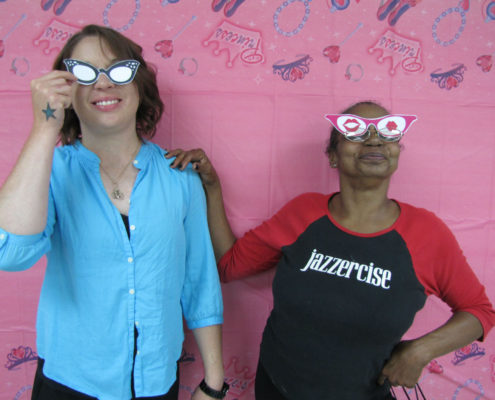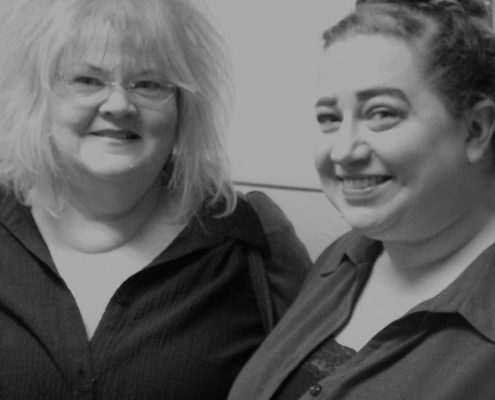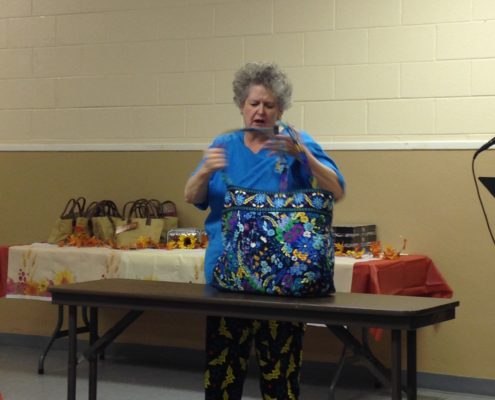
DRESSED FOR SUCCESS
By Maureen Diffley
Fashion shows aren’t new for The Salvation Army – but a fashion show that was part educational program, mostly fun was new for Lt. Stephanie Vincent when she arrived in Amarillo, Texas.
For the past four years, the “Dressed for Success” fashion show has been an annual event for the corps and social services programs in Amarillo. Lt. Vincent has been glad to learn and now lead a great program started by her area commander, Major Ann Johnson. The show held on November 9, 2017 shared job-readiness themes in a way that was silly and fun.
Silliness is a kind of intimacy. Seeing caseworkers model “what not to wear” get-ups breaks down barriers for women who are clients of social services. Some clients also model. For one of them, the fashion show was a breakthrough from services to relationship.
Lt. Vincent recounts that during the preparation and the show itself, the process involved “informal interaction and fun. [The woman] got to see The Salvation Army from another angle.” She and her children are now engaged in corps activities. In February, she completed a training course for local leaders.
The corps aims to make the fashion show a community event. They create invitations to hand out individually to community members not affiliated with The Salvation Army, board members, shelter residents, volunteers, and social services clients. They also distribute a flyer at youth programs, so children can invite their moms, and announce the event at church services. In the past, the event was held in the women’s shelter dining room and sometimes felt like a shelter program. By having the fashion show at the church for the past two years, the event has become a “ladies night out” for shelter residents, as well as a fun night for families and youth from the community, according to Lt. Vincent.
The Models
Models for the fashion show include employees, clients and ex-clients. Using “women who are familiar” to social services clients makes the event feel informal and more fun. Finding clients who will enjoy modeling is a process that relies upon caseworkers’ good relationships.
Lt. Vincent has a conversation with the caseworkers, most of whom already know about the fashion show, to encourage them to identify women who might enjoy modeling in the show. Caseworkers individually suggest to clients that they might like the opportunity. If they are interested, then the caseworker connects them to the corps officer – in this case, Lt. Vincent.
After having a conversation with each of the women individually, the rest of the preparation is “not too complicated”. Lt. Vincent picks up all the women (just a handful) one night and takes them to the thrift store to pick outfits and plan hair and make-up. The clients get the “what to wear” clothes, while staff tend to get more of the “what not to wear” items. Each client who models gets to keep three outfits. Set-up on Friday and Saturday includes run-throughs before the show with all the participants. Lt. Vincent notes that this time together is also a great “opportunity for fellowship.”
“Our clients feel so special and a part of it as models,” said Lt. Vincent “It changed their attitude” from that of recipient clients to confident women in fellowship.
The Program
The Dressed for Success program is relevant for many shelter residents and social services clients, who are out of work or seeking more work currently. Nevertheless, it serves as a useful reminder for any woman, since job security is rare and seeking better opportunities is common.
During the show, positive advice is given, such as:
- Show up early.
- Exemplify great hygiene.
- You and your clothes should be clean.
- Make sure your clothes are wrinkle and stain-free. (Iron!)
- Fix your hair to look nice and neat.
- Wear deodorant, skip or lightly use fragrance, brush your teeth.
- Check your teeth for lipstick, food, etc. beforehand!
- Apply moderate cosmetics.
- Wear clothes that fit well, neither too tight nor too loose, and communicate the seriousness of your interest in the job opening.
- Wear clothes in a color that suits you and will be perceived as professional.
- If you do not have the right kind of clothes for an interview, you can find nice things at a thrift store. It isn’t always necessary to spend a lot of money on work-and interview-appropriate clothes.
- Plan the positive things that you will tell the interviewer about yourself.
- Prepare answers to potential questions.
- Plan how you will introduce yourself.
- Show you are engaged and confident through your posture, including when you sit down.
Things to avoid, both in terms of dressing and behavior, are also shared and come from real-life interviews gone wrong, according to Lt. Vincent. Participants see examples of what not to do like:
- Do not have your cell phone in your hand during your interview.
- Most especially, do not USE your cell phone during the interview or TALK ON IT. (Yes, it happened.)
- Do not chew gum, mints, etc. (or have them in your mouth).
- Do not put on lots of make-up. You don’t need a mask. You don’t need to look like you are going to or coming from the club.
- Do not wear leggings, tube tops, low-cut blouses, high-cut skirts, mini-skirts, stiletto shoes. Avoid shiny, bling-y items. You don’t need to look like you are going to or coming from the club.
- Do not wear leggings, sweat pants, tank tops, pajamas, slippers or ripped clothes. You don’t need to look like you just woke up or are cleaning.
- Do not forget to check your hair before you enter the interview site. Don’t have unkempt hair or an over-the-top fancy hairdo.
To help make the overall program feel special, the space is decorated for the occasion. In addition, nice finger foods and desserts are provided – and enough of them, so participants can make a meal of it.
A strong musical number and relatable devotional thought help to connect the fun of the fashion show with the serious themes addressed. At this event, Major Deanna Gilliam spent time considering how in our pursuit of new work opportunities we have an opportunity to reflect God’s glory. We have the capacity to present ourselves in that way already with how we dress, speak about ourselves and interact with interviewers.
Lt. Vincent shared that she has put this program “in a file” for use at future appointments because it is a great recreational and educational program that is easily replicable in a Salvation Army setting. She indicated that Major Johnson had previously conducted the program at another location. (We’re not sure if she wore the same pajama bottoms, though!)
You can download the outline to this program with the article HERE.
Captain Maureen Diffley is the Program Specialist for Women’s Ministries at The Salvation Army’s Southern Territorial Headquarters in Atlanta, GA.





